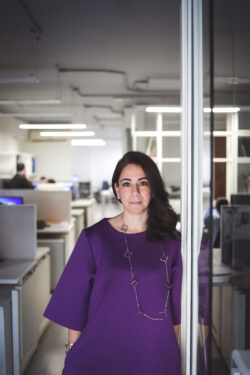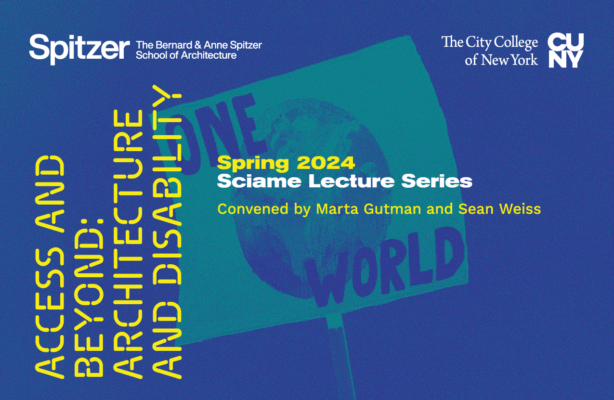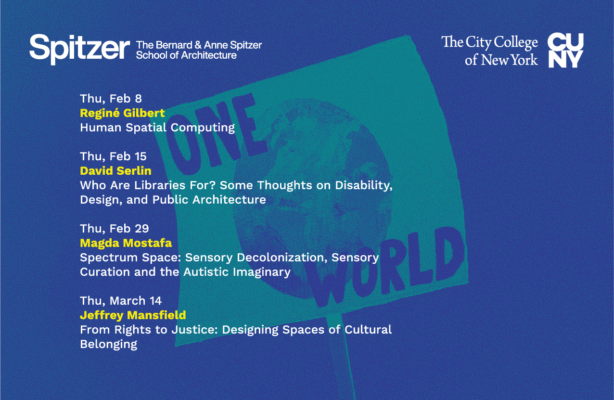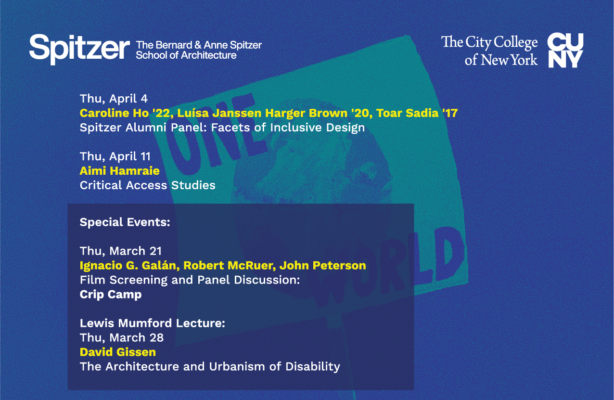Events
Spring 2024 Sciame Lecture Series: Magda Mostafa
Spectrum Space: Sensory Decolonization, Sensory Curation and the Autistic Imaginary
Thursday, Feb 29, 2024
5:30 pm - 7:00 pm
Sciame Auditorium (Room 107)
141 Convent Avenue
New York, NY 10031

This lecture will be in person and is part of the Spring 2024 Sciame Lecture Series, titled "Access and Beyond: Architecture and Disability."
Magda Mostafa is Principal of StudioTM and Professor of Design at the American University in Cairo. As an architect focusing on autism, she is the author of the ASPECTSS Design Index, the world’s first research-based design framework for autism. ASPECTSS was awarded the UIA Triennial Research Award in 2014 and Mostafa is the only laureate to be presented this award twice, awarded again in 2023. Through her consulting, ASPECTSS has been used in architectures for autism and neurodiversity across 5 continents. Her work was also exhibited at the 2021 and 2023 Venice Architecture Biennales. She collaborates globally with practices such as Mimar; Ab Rogers; Altus; VMA; SFS; and JSA/MIXdesign where she is Autism Design Lead. Information about her work can be found at her website www.autism.archi.
"Spectrum Space: Sensory Decolonization, Sensory Curation and the Autistic Imaginary": Social justice, accessibility, and spatial parity have always found intersections, albeit challenging ones- in our social discourse. Notions such as Human-Centered Design have recently emerged as the practical mechanism through which designers may negotiate the nuance of such intersection. Inherited social constructs however continue to color our view, defaulting to a normative definition of the “Human” at the center of “Human-Centered Design”- one that assumes a 6 ft tall, ambulatory, white, English-speaking, seeing, hearing, verbal, neurotypical, ci-gendered, straight male occupying this crucial center point. The reality of our human fabric contrasts dramatically from this definition.
This talk aims to expand this definition- specifically through the lens of autism and neurodiversity and discuss the challenges of Sensory Colonisation of our cities and spaces through this lens. It presents the construct of Spectrum Space, a proposition of senso-socio-spatial gradients born from work with the Autism ASPECTSS Design Index for over two decades. Published in 2014, and expanded in 2021, ASPECTSS is the world’s first research-based design framework for autism.
The talk traces the trajectory of ASPECTSS from its motivation in 2002, to its inception in 2014 and its continued application in curatorial, scholarly and design practices. Told through a series of encounters with the autistic experience the talk will present autism as expert, author and curator of design experiences as translated into architectures of learning, living, community and care.
Suggested Reading: Mostafa, M., (2021) "Building for a Differently Abled World" pp. 64-71, in Architecture for All, IQD, December 2021, Milan, Italy.
"Access and Beyond: Architecture and Disability" answers the call for disability justice in our time. Architects, designers, and scholars, inspired by critical disability studies, make up the distinguished roster of speakers who situate disability, ability, and access in pointed, specific critiques of design, culture, and power. This series invites practitioners to probe assumptions embedded in universal design, to center belonging in design practice, to critique technology in relation to inclusion, and to apprehend the rich contribution of difference in the sensorial experiences of places.
All lectures are free, open to the public, and held in the Bernard and Anne Spitzer School of Architecture Sciame Auditorium. Live captioning and ASL interpretation will be available upon request. For access requests or questions, please contact ssadean@ccny.cuny.edu.
See https://www.ccny.cuny.edu/return-campus for current requirements for in-person visitors.
This lecture series is made possible by the Spitzer Architecture Fund and the generous support of Frank Sciame ’74, CEO of Sciame Construction.
Export as:


![Spring24 Lecture Series Email [recovered] 07 Mostafa](https://ssa.ccny.cuny.edu/wp-content/uploads/2024/01/SPRING24-Lecture-Series-Email-Recovered-07-Mostafa-614x400.png)


